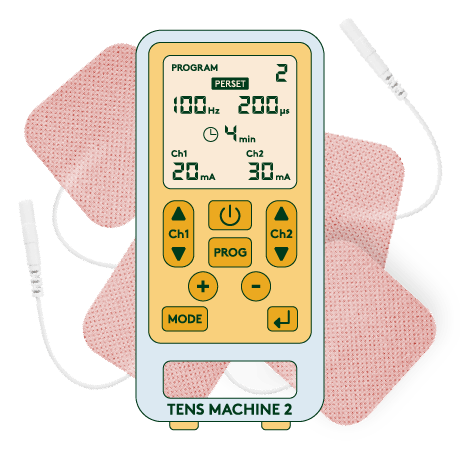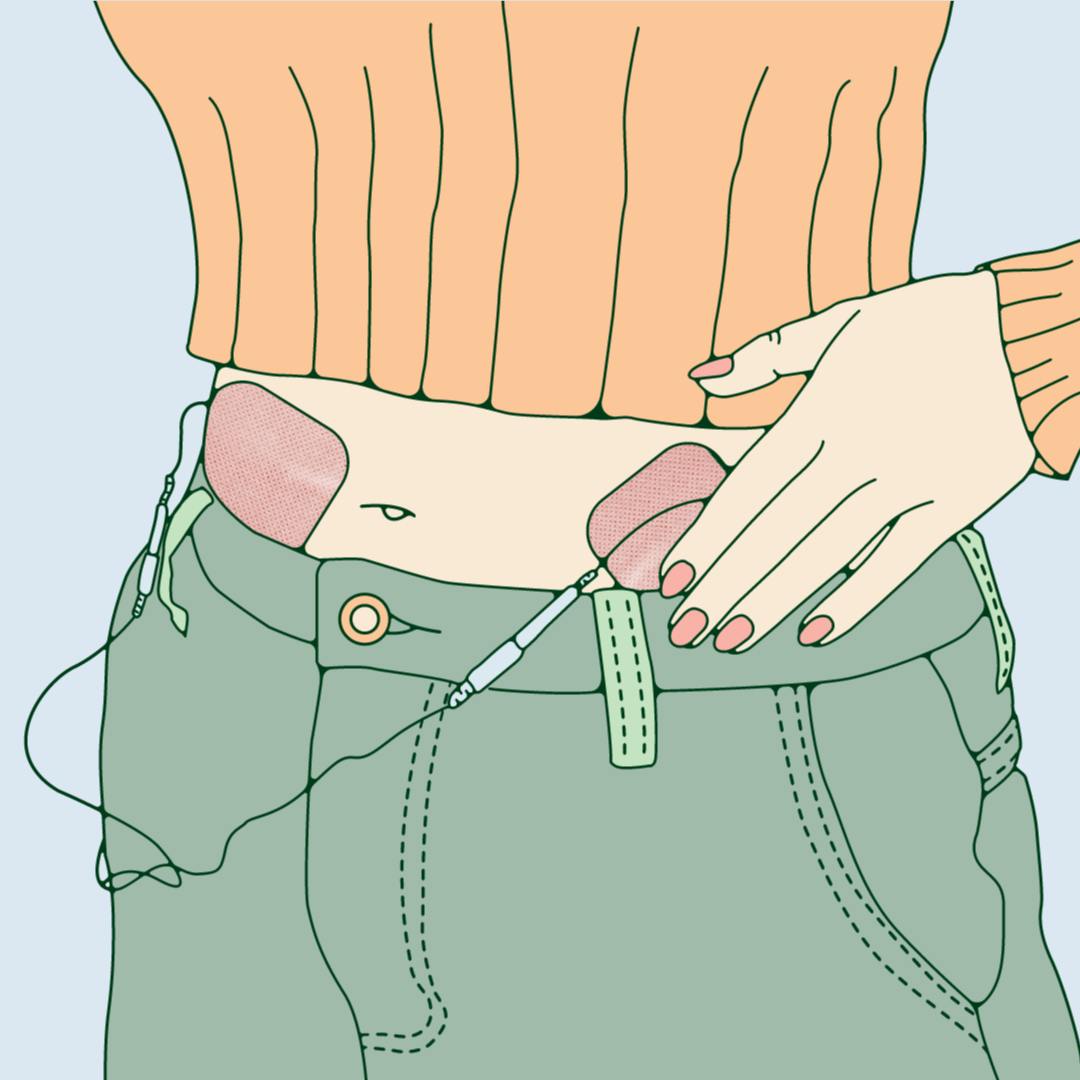Table of contents
1. What is a TENS machine?
2. How does a TENS machine relieve period pain?
3. What are the advantages of using a TENS machine for period pain relief?
4. What are the disadvantages of using a TENS machine for period pain relief?
5. Is a TENS machine safe to use?
Illustrated by Sabrina Bezerra, Erin Rommel & Valko Slavov
Whether it’s contraception, orgasms, a heating pad or CBD, it seems there are (happily) ever-increasing potential ways to minimise the excruciating period cramps that reduce so many of us into grimacing wrecks every month – not to mention new and novel ways of closing the gender pain gap.
And now, we’re going to introduce yet another possible way for you to ease your menstrual cramps each month.
Have you ever heard of a TENS machine? While there’s no guarantee they could minimise or stop period pain – and there are myriad considerations when it comes to their usage, they could support you on your journey of kicking your menstrual cramps to the curb.
At Daye, we believe in the delivery of personalised healthcare and one of our values in “Health on Your Terms”. We think every body should have access to a varied range of health and period pain management solutions that fit their unique needs and preferences. Personal reports and clinical evidence both show that TENS machines may have a positive impact on your cramps, so let’s dive deeper and learn more about this novel pain management method.
What is a TENS machine?
Dr. Michael Green – Chief Medical Officer/OB-GYN at Winona – describes TENS machines as the following: “A pain relief strategy applying low-voltage electrical currents to the skin via small electrodes”. Flo, a period tracking app, confirms that a TENS unit contains leads that connect to electrodes, or sticky pads, which must be attached directly to your skin. Once powered on, the TENS machine delivers mild electrical impulses to the affected region, causing a tingling sensation’.
Now that we understand how a TENS machine works in practice, let’s learn more about how it could reduce period pain:
Virginia-Arlene Go, MD: Board Certified Obstetrician and Gynecologist, Reproductive Endocrinology and Infertility Fellow, goes into more detail. “TENS stands for transcutaneous electrical nerve stimulation,” she says. “[A TENS machine] is a small device that delivers low-voltage electric currents near nerves or trigger points to treat [various forms of pain]”.
“The pain can be acute or chronic and typically is neuropathic or musculoskeletal in nature,” Go continues. “TENS ultimately works by blocking transmission of messages to pain receptors, or nociceptors. TENS can selectively deliver signals to non pain receptors, which subsequently reduces pain by decreasing nociceptor activity.”
The other theory is that nerve stimulation raises the level of endorphins, which are the body’s natural pain killing chemical. The endorphins then block the perception of pain.
TENS machines are thought to be effective when it comes to pain resulting from the following causes:
- Period pain
- Labour pain
- Joint pain
- Back pain
- Endometriosis
- Arthritis
- Fibromyalgia

How does a TENS machine relieve period pain?
“The uterus is a muscle and hyper contractility is often the source of menstrual pain, thus TENS may be used for that musculoskeletal pain,” says Go. “In addition to the previously described mechanism of TENS, blood flow to the uterus and prostaglandin release may also be altered by TENS which can lead to decreased pain.”
But Green warns that the jury is largely still out, when it comes to TENS machines as a method for soothing cramps. “While TENS machines have been used for pain relief in many different conditions, the effectiveness for period pain – or dysmenorrhea – is somewhat unclear,” he says. “Some evidence suggests that TENS machines may relieve menstrual pain, though the results of studies have gone both ways. Some have found that TENS effectively reduces pain during menstrual periods, while others have not found a significant difference in pain relief between TENS and a placebo. It might vary from person to person or reduce pain perception for other reasons.”
“
TENS machines “have a good safety profile when used on appropriate patients.
What are the advantages of using a TENS machine for period pain relief?
Overall, there are considerable advantages to using TENS machines. “TENS is a non-hormonal, non-invasive, non-medication, local treatment which can be used in conjunction with other treatments,” Go summarises. “Additionally, there should be no overdose or addiction/dependence risk and TENS is highly adjustable in regards to intensity [and] frequency.”
A TENS machine is small and discreet, too. In a review of the Livia, Slate pointed out that, ‘It clips to the edge of your pants, with wires that are exactly the right length to attach to your stomach.’ Who can argue with that?
What are the disadvantages of using a TENS machine for period pain relief?
As Green said earlier, there’s just not enough data right now to know for sure whether TENS machines can be effective in minimising period pain. “TENS may not be effective in every patient or in every case of period pain,” Go explains. “There is a lack of quality randomised control trials supporting its superiority alone compared to other traditional therapies or combination therapy.
“Also, not every patient is eligible to use TENS,” Go continues. “It is not recommended for menstrual pain if a patient has an implanted electronic device [like the aforementioned pacemaker] or cancer near the intended site of application.” Go adds that it’s also not recommended for those suffering from heart disease, bleeding disorders or blood clots (it might increase the risk of bleeding in those with bleeding disorders, and may increase blood circulation which, in turn, increases the risk of dislodging a blood clot).
“
Avoid using TENS machines on any part of your body with broken skin or [a] rash!
Is a TENS machine safe to use?
“TENS machines are generally considered safe to use and do not have any known side effects as long as used properly,” says Green.
Go confirms this, detailing that TENS machines “have a good safety profile when used on appropriate patients”; but she emphasises that they “overall cannot be used in pregnancy [or patients with] epilepsy or pacemakers [plus some other conditions, as detailed above].
When it comes to side effects, Go outlines: “The reported complications are mainly related to burns, irritation and/or allergic reactions at [the] site of electronic placement”. Green agrees, emphasising that you should “avoid using TENS machines on any part of your body with broken skin or [a] rash!”.
Pretty much any source – including Lloyds Pharmacy – will tell you not to use the TENS machines on the following areas:
- ‘The front or sides of your neck;
- ‘Your mouth, temples or eyes’;
- ‘Your chest or upper back at the same time’;
- ‘Numb areas’;
- ‘Varicose veins, irritated or broken skin’.
Green also wants you to know that TENS machines can cause discomfort, and that they must be used regularly to be effective. Plus: “Most importantly, [they] may not reduce pain or other symptoms of discomfort, even if used correctly.”
Go, too, ends with a parting warning. “Although there is no risk of overdose or addiction, habituation is possible and may lead to decreased efficacy over time and even worsening of pain in some cases,” she points out. “Patients are recommended to take breaks from TENS use and change electrode placement over time.”
If you think TENS could be an option for you, then – by all means – speak to a healthcare professional about it. The NHS says, ‘A physiotherapist or pain specialist may be able to loan you a TENS machine for a short period if they think it could help,’ and adds that, ‘You can choose to buy your own TENS machine without getting medical advice, but it’s generally better to have a proper assessment first, so you can find out whether a TENS machine is appropriate for you and be taught how to use it properly.’
If you’re interested in a TENS machine as a form of period pain relief, we’d recommend speaking to a healthcare professional first. Be sure to disclose any existing health issues or concerns (particularly those listed above); and, most of all, know that there isn’t any guarantee of it soothing cramps. We wish you the best of luck with it, though; goodness knows, we need more period pain relief in the world.






